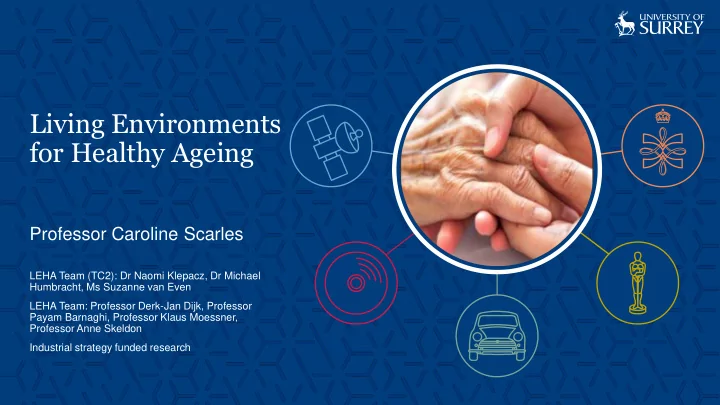

Living Environments for Healthy Ageing Professor Caroline Scarles LEHA Team (TC2): Dr Naomi Klepacz, Dr Michael Humbracht, Ms Suzanne van Even LEHA Team: Professor Derk-Jan Dijk, Professor Payam Barnaghi, Professor Klaus Moessner, Professor Anne Skeldon Industrial strategy funded research
Technical Capacity One and Two • Older people spend a significant amount of time indoors, contributing to physical and mental health problems. • Urgent need to address problems linked to loneliness, social disconnection and physical immobility Technical Capacity One – Technological Interventions Technical capacity Two – Brining the Outdoors, Indoors to Develop In-Home Sensing Solutions Using Immersive Technology Aim is to identify parameters of the indoor-living and work Aim is to understand how to create stimulating, innovative environments that contribute to mental and physical health living environments that bring virtual mobility opportunities and and design sensor systems for factors linked to the multisensory stimulation into care environments. environment, sleep and their health indicators. #universityofsurrey 2
Themes from Workshops » The importance of bringing the outdoors indoors, particularly for older adults with mobility issues. » Use of technology to combat social isolation (loneliness, boredom and fear) and improve emotional wellbeing » Technology to assist physical aspects of healthy ageing » Increase overall quality of life for care home residents with limited mobility by offering them immersive experiences of blue and green spaces in their care home (i.e. a familiar space), » Personalisation and familiarity are key for enhancing engagement with immersive experiences » The importance of developing a LEHA toolkit with a range of technological applications #universityofsurrey 3
TC2 - State of the Art » 1,291 total articles, 23 primary articles identified after selection process • Focused on 1) virtual reality and 2) multisensory stimulation environment Research suggests that immersive technologies can have a positive impact on factors associated with healthy ageing: • Psychological and emotional well-being – virtual nature walks can lead to joy and decease in depression • Virtual or physical outdoors – experiencing nature images reduces aggression and improves engagement • Mobility – Virtual travel to nature highly valued, and can lead to increased exercise with VR • Building and maintain relationships – some evidence for positive effects on carer relationships » Conclusion: When research directly linked restorative outdoors environments (i.e. a natural blue or a green space) to healthy ageing, positive impact was greater. #universityofsurrey 4
Bringing The Outside Inside • Participants asked to try both virtual reality and multisensory stimulation experience • Research team created content based on participant involvement workshops (4 residents, 1 HH rep) • 10 residents took part supported by 3 care staff (all over 70, 5 men and 5 women) LEHA situated across a spectrum Virtual natural environment Physical Outdoors Remember past experiences Having new experiences Individual Community Social isolation Social Interaction “This is the first time in 18 months that Charles has come out of his room for something other than a doctors appointment.” #universityofsurrey 5
Research Findings Three themes emerged from research: » Familiar versus Strange (authenticity) • Wanted versus unwanted memories • Personal memory or collective memory (authenticity determined by memory of actual location or general imagery of nature) • Social interaction (e.g. memories of social interactions at settings determined authenticity) • Personal taste (e.g. personal preference determined authenticity) • Potential memories (new desires to travel to new places and more personal spaces) » Physical and digital (physical: residential care home, the body, tech material; Digital: visual media and sound) • Bodily ability to interact with digital/tech material • Contrast between low-tech media and high-tech (video and sound used normally, was familiar and valued most) » Socialisation and social interaction • Generating social interaction (Importance of new interactions with researchers or sharing experience with other residents/carers) • Potential for social interaction (experience generated desires/ideas for sharing experience with family/friends, other residents) • Feelings of missing out on social interactions #universityofsurrey 6
Recommend
More recommend